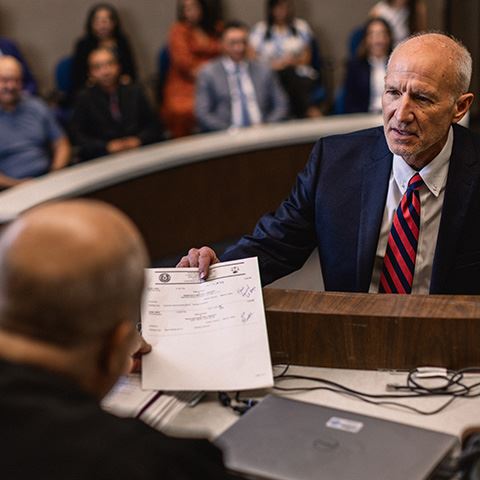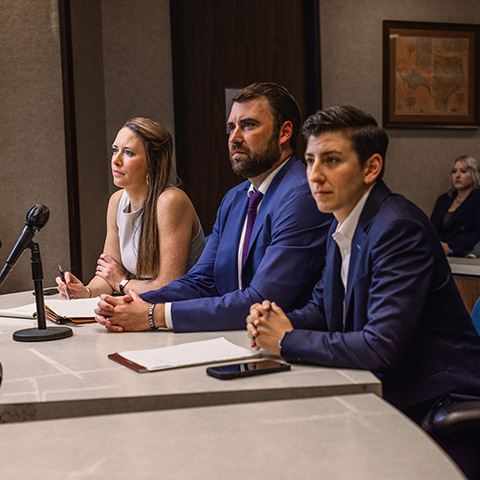Corpus Christi Legal Malpractice Attorneys
Fighting for Victims of Corporate Legal Malpractice in Corpus Christi, TX
Legal professionals carry a unique responsibility due to the significant implications of their actions on clients' lives. Retaining an attorney is not merely a transactional experience for clients: It is an investment of faith in a professional to protect their rights, assets, and potentially even their future. Every attorney has an ethical and professional obligation to effectively represent their clients by displaying thoroughness, competency, and diligence. Any deviation from this expected standard of care can be deemed as an act of negligence.
Legal professionals should be held accountable for their actions or inactions that fail to meet these standards, as they can cause great harm to their clients. Holding attorneys accountable not only compensates victims of legal negligence but also ensures a higher standard of practice within the legal profession.
At Hilliard Law, we are committed to holding other legal professionals accountable for negligence. Our Corpus Christi legal malpractice lawyers have a deep understanding of the law and the standards that legal professionals must adhere to. When these standards are not met and you or your organization consequently suffer harm, our experienced team is prepared to step in and fight to protect your interests. We take pride in advocating for our clients' rights and in pursuing justice on their behalf, and our case results speak for themselves.
Our team is prepared to take on legal malpractice cases involving matters of commercial transactions, business disputes, bankruptcy, divorce, tax, probate, and more.
Schedule an initial consultation by calling (866) 927-3420 or contacting us online.
What Is Considered Legal Malpractice?
Legal malpractice occurs when an attorney negligently fails to perform according to the standards and practices accepted in the legal community, leading to harm to the client. It is not just about a poor outcome or an unsatisfied client. It involves a significant breach of the duty of care, competence, and diligence that every attorney owes to their clients.
There are four key elements to a legal malpractice claim:
- An attorney-client relationship. This relationship is typically formalized through a written agreement, but it can also be established implicitly in certain circumstances.
- A breach of duty. This means the attorney performed below the standard of care expected of a reasonably competent attorney under the same or similar circumstances.
- Causation. The client must prove that the attorney's negligence was the proximate cause of the harm. In other words, it is not sufficient to show that the attorney was negligent. The client must also demonstrate that the attorney's actions or lack thereof directly resulted in the harm suffered.
- Damages. Even if the attorney was negligent and this negligence caused harm, there must be actual financial loss on the part of the client for a legal malpractice claim to hold.
Again, legal malpractice involves more than an attorney simply not living up to a client's expectations. It is a matter of proving that the attorney was negligent in their duty, this negligence caused harm, and this harm resulted in actual damages. Our Corpus Christi legal malpractice attorneys can help determine whether you have a strong case and review your legal options.
When Does an Attorney Breach Their Duty to a Client?
A breach of duty can have devastating effects on a client's case. Any breach of duty that causes the client harm can potentially form the basis for a legal malpractice claim.
Examples of breaches of duty include (but are not limited to):
- Failure to know or apply the law. This occurs when an attorney lacks knowledge of the law relevant to the client's case or fails to correctly apply it. This could include not knowing recent changes to laws or regulations, misinterpreting the law, or failing to use the appropriate legal strategy.
- Procrastination in performance or duties. An attorney who persistently delays action on a case, causing harm to the client's interest, is considered negligent. This could include not filing documents in a timely manner, not preparing for trial promptly, or not pursuing the necessary legal actions expeditiously.
- Abandonment. If an attorney essentially abandons a client’s case without notifying the client or obtaining the client’s consent, this can be considered negligence. This might occur if an attorney stops responding to a client's communications, fails to proceed with the agreed-upon strategy, or does not prepare for important deadlines.
- Errors in legal strategy. These errors might include choosing an ineffective argument, failing to include a critical piece of evidence, or deciding not to call a key witness. These strategic errors can significantly impact the outcome of the case and may be considered negligent if they deviate from the standard of care expected of a competent attorney.
- Conflict of interest. Attorneys owe a duty of undivided loyalty to their clients. A conflict of interest arises when the attorney's personal interests or their duty to another client interfere with their loyalty to the current client. This could occur if an attorney represents opposing parties in a lawsuit, or if they stand to gain personally from the advice given to a client.
- Confidentiality breaches. Attorneys have a duty to keep their client's information confidential. If an attorney discloses such information without the client's consent, it is a breach of their duty of confidentiality. This could have grave consequences, including the loss of a case, financial loss, or reputational damage to the client.
- Failure to communicate. Attorneys have an obligation to keep their clients informed about their cases and to promptly respond to their clients’ requests for information. If an attorney fails to communicate crucial information about a case, such as settlement offers or significant developments, it typically constitutes a breach of duty.
At Hilliard Law, we are not afraid to take on big firms or renowned lawyers if they have caused you harm!
Discuss your case with our Corpus Christi legal malpractice attorneys by calling (866) 927-3420 or contacting us online today.



Real Results ReaL Justice
-
$50Class Action
Million Settlement*Mr. Hilliard was the lead class counsel in Haese v. H&R Block, a class action lawsuit involving every Texan who received a rapid refund from H&R Block (approx. 300,000 plaintiffs). He assisted other class counsel in forcing H&R Block to disclose it received kickbacks for arranging loans between its tax preparation clients and predatory lenders.
-
$20Property Damage
Million SettlementOn the eve of the arbitration hearing, Hilliard Law attorneys obtained a $20 Million settlement on behalf of Nueces County, Texas for property damage that occurred as a result of Hurricane Harvey.
-
$13.5Predatory Lending
Million VerdictIn 2005, Mr. Hilliard represented multiple plaintiffs in litigation with Ocwen Loan Services, LLC (formerly Ocwen Federal Savings Bank) on allegations of predatory lending. Mr. Hilliard tried two cases which resulted in combined verdicts of $13.5 million.
We Can Help Enforce Your Rights If You Were Harmed by Legal Negligence in Corpus Christi, TX
You have the right to seek compensation for any damages suffered as a result of your attorney's negligence or breach of duty. These damages can include financial losses, emotional distress, and, in some cases, punitive damages aimed at punishing particularly egregious behavior.
Enforcing these rights typically begins with filing a legal malpractice lawsuit against the offending attorney or law firm. This lawsuit should clearly state your grievance, providing detailed descriptions of the attorney's actions or inactions that led to your harm. It's crucial to note that the burden of proof lies with you as the plaintiff. You must provide sufficient evidence to demonstrate that your attorney's negligence directly caused your harm and resulted in actual damages. Our Corpus Christi legal malpractice lawyers understand how to successfully approach these matters and can help build a strong claim.
The state of Texas enforces time limits on pursuing a legal malpractice claim, known as the statute of limitations. You must file your claim within two years after the date the malpractice occurred or from the date you should have reasonably discovered it.
In addition, you also have the right to report the offending attorney to the state bar association. The bar association has the power to investigate your claims, potentially leading to disciplinary action against the attorney, which can range from reprimands to suspension or even disbarment, depending on the severity of the misconduct.


It’s our mission to hold the powerful accountable for their wrongdoing. Reach out to our team immediately regarding your case to schedule a free attorney consultation today.


